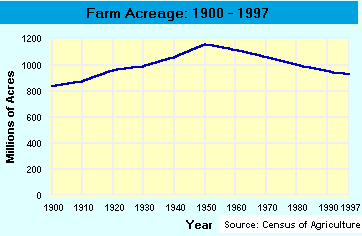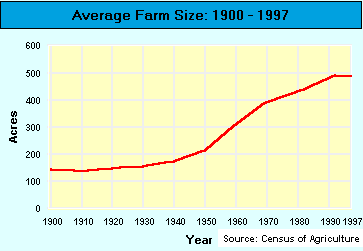Land
Use Overview
 The
United States is blessed with more arable land than any other nation on
earth. Still, only about one-fifth of our land area (382 million acres)
is used for crop production. Grazing land for livestock accounts for about
one-fourth of the privately held land in the U.S. (525 million acres).
In spite of a growing population and increased demand for agricultural
products, the land area under cultivation in this country has not increased.
While advanced farming techniques, including irrigation and genetic manipulation
of crops, has permitted an expansion of crop production in some areas
of the country, there has been a decrease in other areas. In fact, some
3,000 acres of productive farmland are lost to development each day in
this country. There was a 4% decline in the number of acres in farms that
over the last decade. In 1990, there were almost 987 million acres in
farms in the U.S., that number had been reduced to just under 943 million
acres by 2000. The
United States is blessed with more arable land than any other nation on
earth. Still, only about one-fifth of our land area (382 million acres)
is used for crop production. Grazing land for livestock accounts for about
one-fourth of the privately held land in the U.S. (525 million acres).
In spite of a growing population and increased demand for agricultural
products, the land area under cultivation in this country has not increased.
While advanced farming techniques, including irrigation and genetic manipulation
of crops, has permitted an expansion of crop production in some areas
of the country, there has been a decrease in other areas. In fact, some
3,000 acres of productive farmland are lost to development each day in
this country. There was a 4% decline in the number of acres in farms that
over the last decade. In 1990, there were almost 987 million acres in
farms in the U.S., that number had been reduced to just under 943 million
acres by 2000.
 Development
pressure on farmland at the rural-urban interface is posing long-term
challenges for production agriculture and for the country as a whole.
This is especially significan since about two-thirds of the total value
of U.S. agricultural production takes place in, or adjacent to, metropolitan
counties (NRCS). About 1/3 of all U.S. farms are actually within metropolitan
areas, representing 18% of the total farmland in this country. Development
pressure on farmland at the rural-urban interface is posing long-term
challenges for production agriculture and for the country as a whole.
This is especially significan since about two-thirds of the total value
of U.S. agricultural production takes place in, or adjacent to, metropolitan
counties (NRCS). About 1/3 of all U.S. farms are actually within metropolitan
areas, representing 18% of the total farmland in this country.
Two significant trends occurring in the agricultural sector during the
past century involved the increased use of machines and government price
supports. These factors combined to allow operators to increase the size
of their farms and gain efficiencies.
Adapted
in part from USDA NASS 
|

